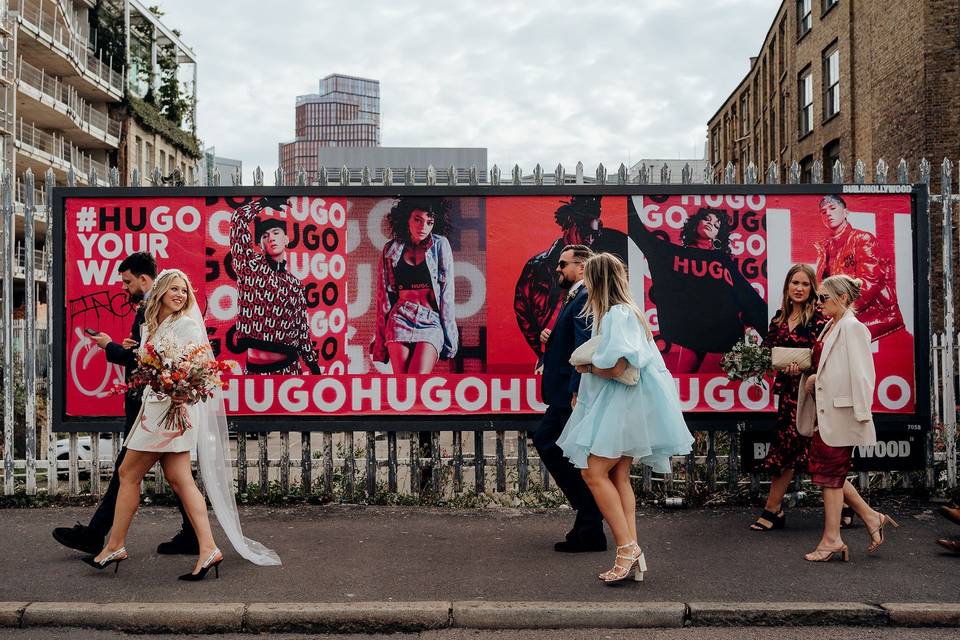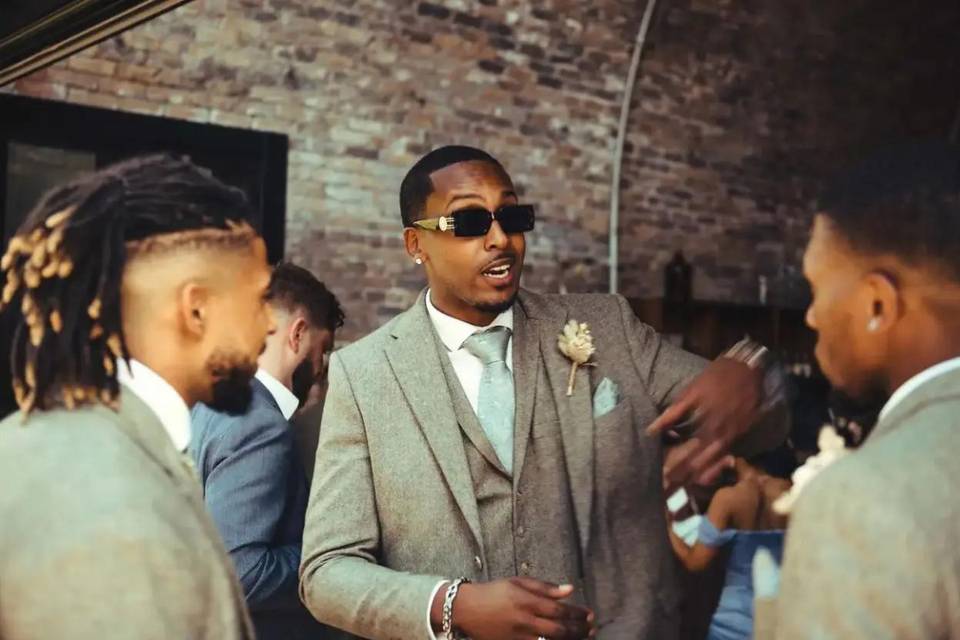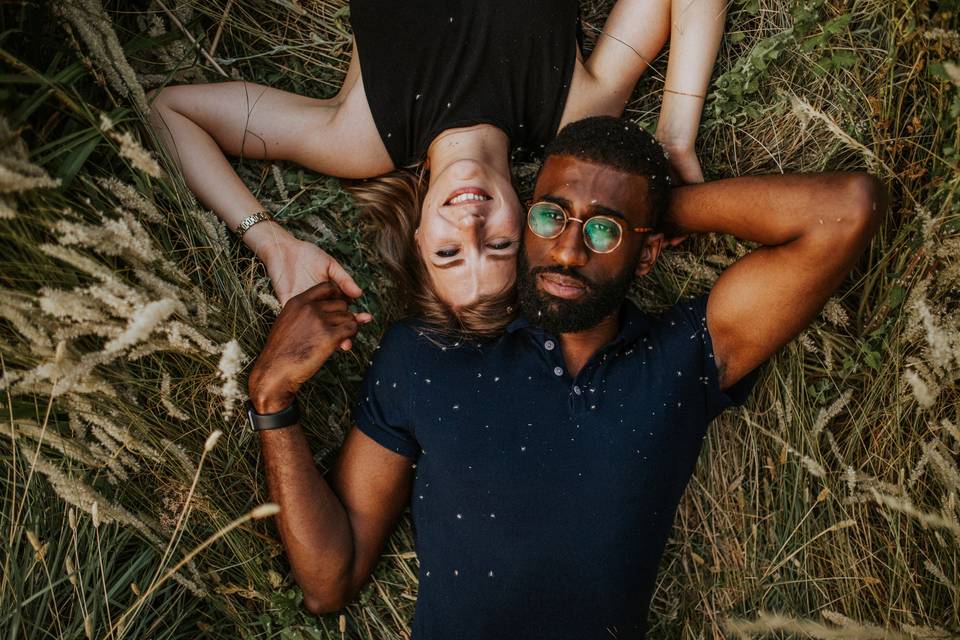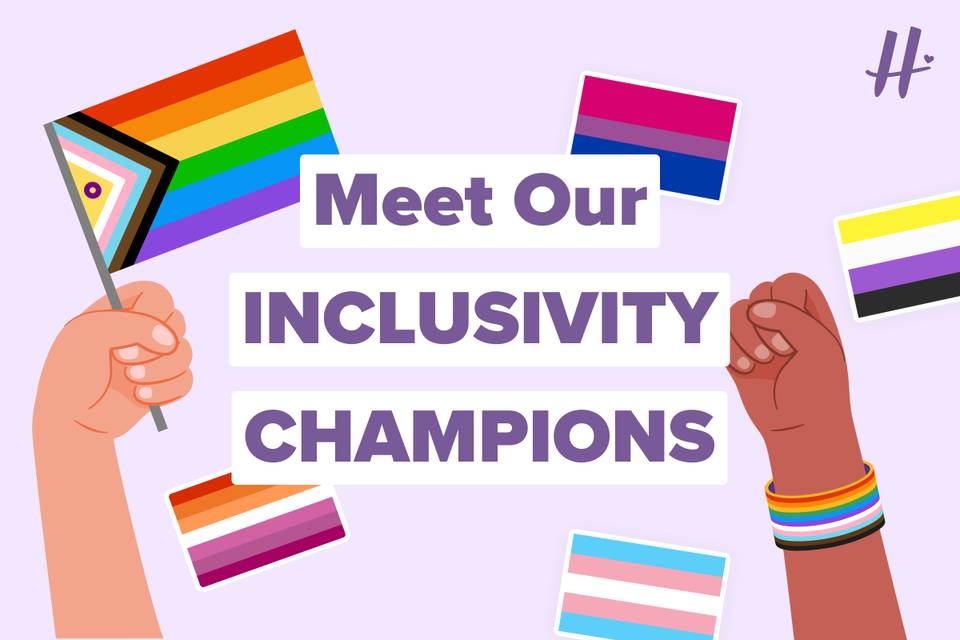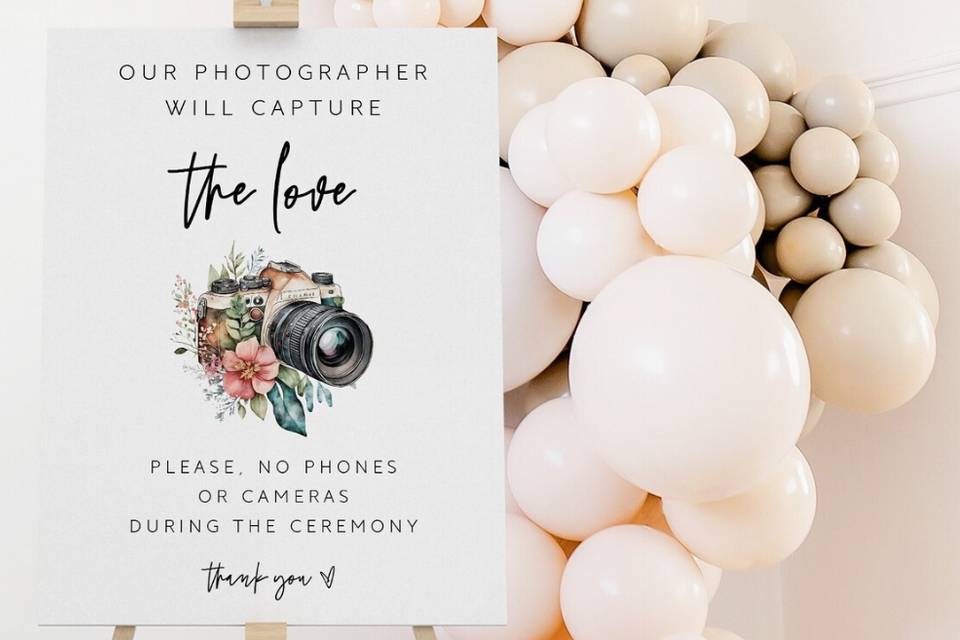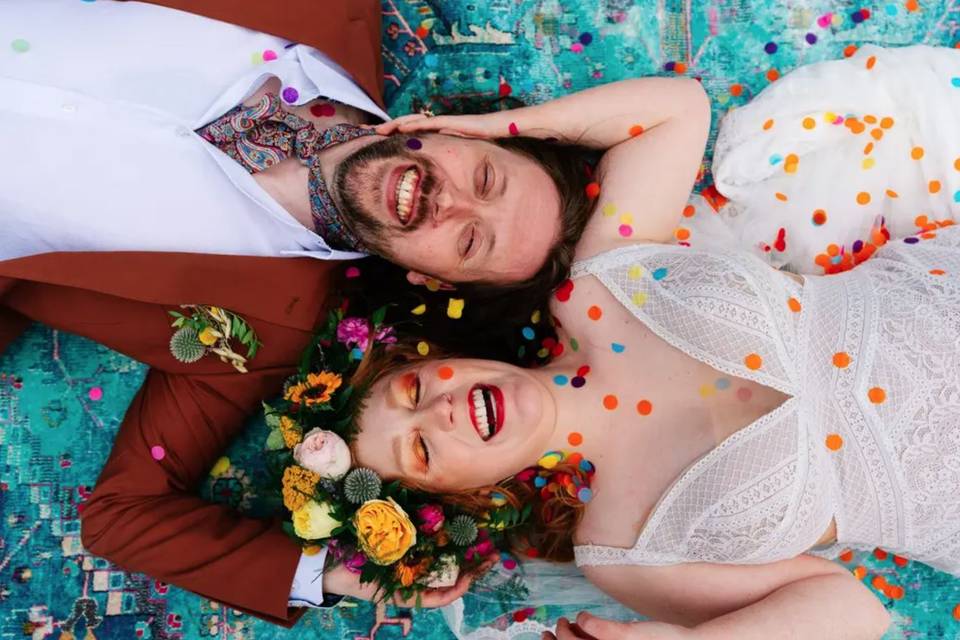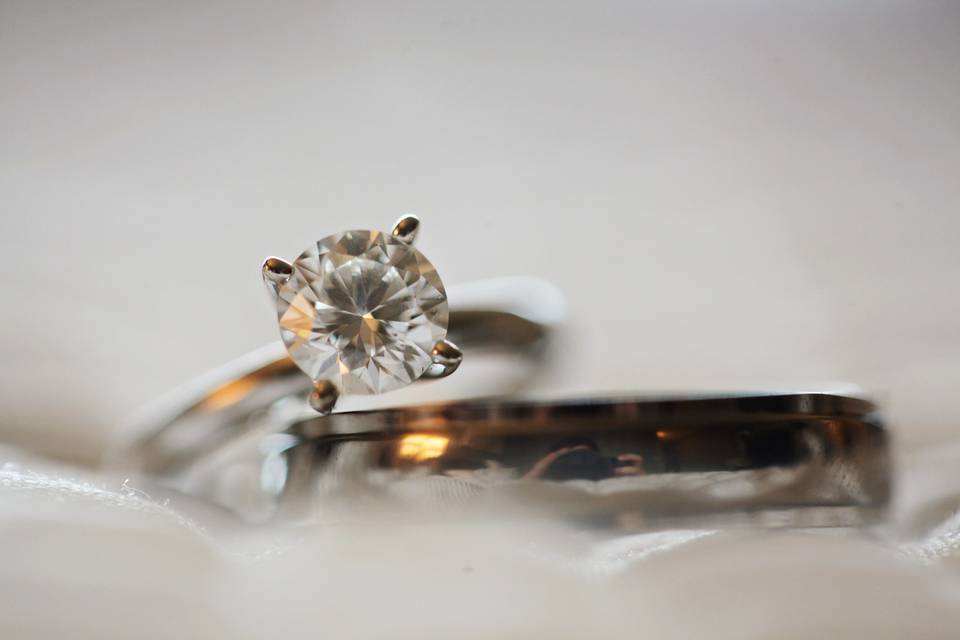We Need to Talk About Harassment at Weddings
For many, a wedding is a joyful, wonderful experience, but for marginalised groups, there can be a darker side. We explore harassment at weddings and how to keep people safe
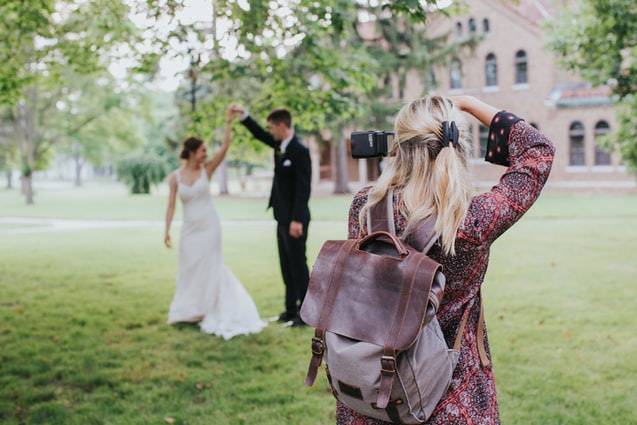

When you go to work, you expect to be safe from harassment, threatening behaviour and insults. For those who work in weddings, the expectation is a setting of joy, happiness and convivial togetherness - and for the most part, this is the case. But at Hitched we’ve been troubled to see wedding photographers - predominantly female, LGBTQIA+, non-binary individuals - sharing stories of harassment and unacceptable behaviour towards them as they work at weddings. Zoe Burke, Editor of Hitched, spoke to some of the photographers affected to learn more…
It started with an Instagram story. Wedding photographer Caroline Goosey shared a series of Instagram stories highlighting the violations and abuse she had experienced and noted that it had increased following the return of weddings after the pandemic.
“This behaviour has never been ‘off my radar’ really,” she explained. “This last year has stood out in my mind as being the worst for sex-based harassment at weddings, and I decided to speak up because I had a string of weddings where I saw it happening to my second shooters and experienced it myself. I don’t want my daughter to grow up in a world that objectifies her, or for my son to grow up thinking it’s ok to objectify women, so I couldn’t not say something.”
In an informal poll conducted by Caroline in 'Shoots Like A Girl', a private photography group she is part of on Facebook, a shocking 75% of the wedding photographers in the group* said they had experienced some form of harassment whilst working at a wedding.
“There’s a lot in our industry that needs fixing, and I see a lot of people ready for that conversation,” says Caroline.
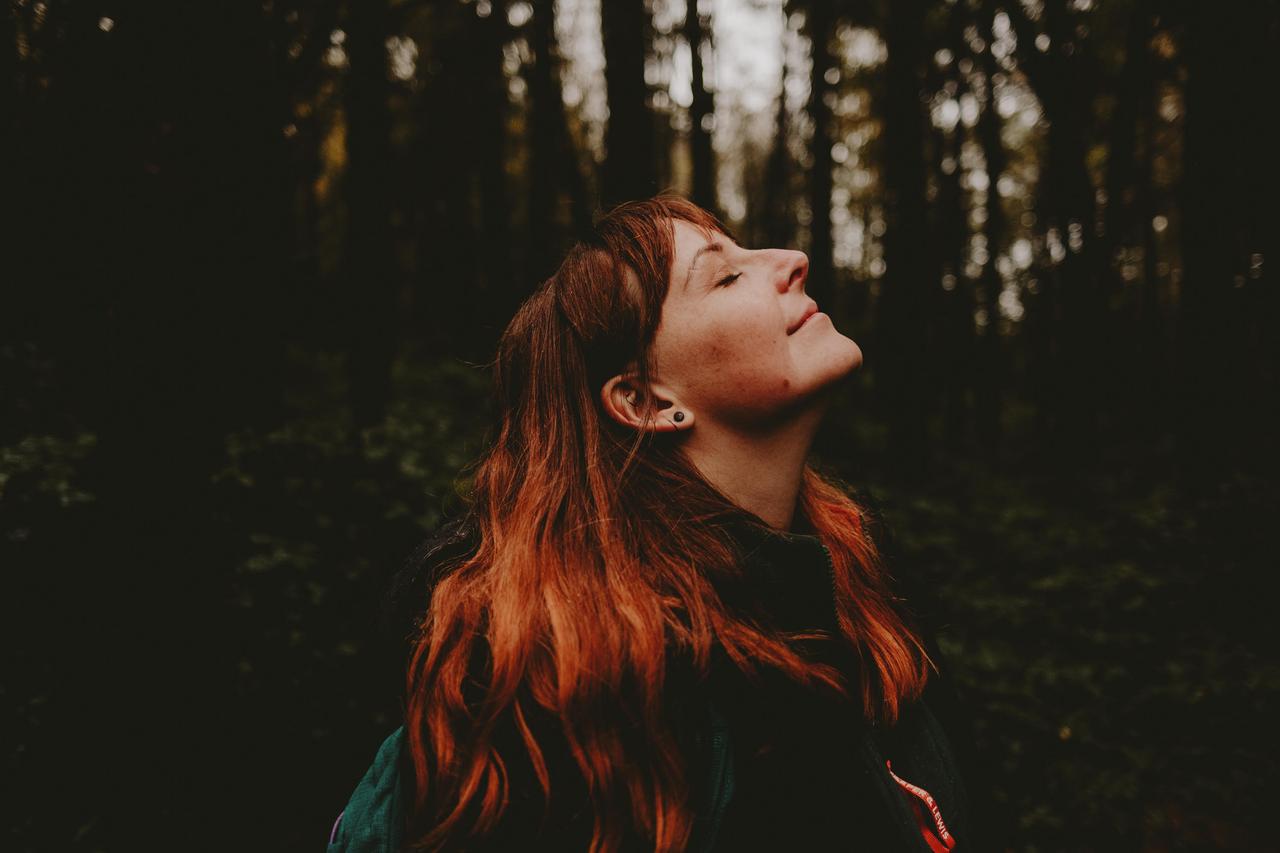
“Most women understand the issues well enough, and their willingness to engage comes as no surprise to me. We already know from the various campaigns to keep the wedding industry front of mind during the pandemic that we are fantastic at shouting out when something needs to change, and I know this is a fight we’re only at the beginning of.
“I’ve gotten off very lightly in comparison to some of my industry peers. I’ve been cat-called, sworn at in very strong language, asked to have a drink with just male guests (while working!), I’ve been told to stop fannying about, bothering the men and go and get a real job.
“I’ve been asked if I have a boyfriend or a husband. I’ve been asked to find someone’s hotel room. And that’s just me! I’ve seen my second shooters get harassed in other ways, including a guest who was pretending to take a selfie but instead taking a photo of her.”
Wedding photographer Kim Williams recalls similar experiences on the job: “Harassment at weddings isn’t new to me. My mates and partners have heard me venting about it for the years I’ve been working at them. Every time I rocked up on a wedding day and saw I was working with fellow female suppliers we all audibly sighed with relief - we are women, or non-binary or femme presenting, so we know how it is to navigate a world of every day sexism. Of course it’s happening at weddings - it’s happening everywhere, all the time.”
A post on 23rd January on Kim’s Instagram page went viral. Titled ‘Things Men Did to Me at Weddings in 2021’, she shared the unpleasant experiences she’d had whilst working at some of the weddings she worked in 2021.
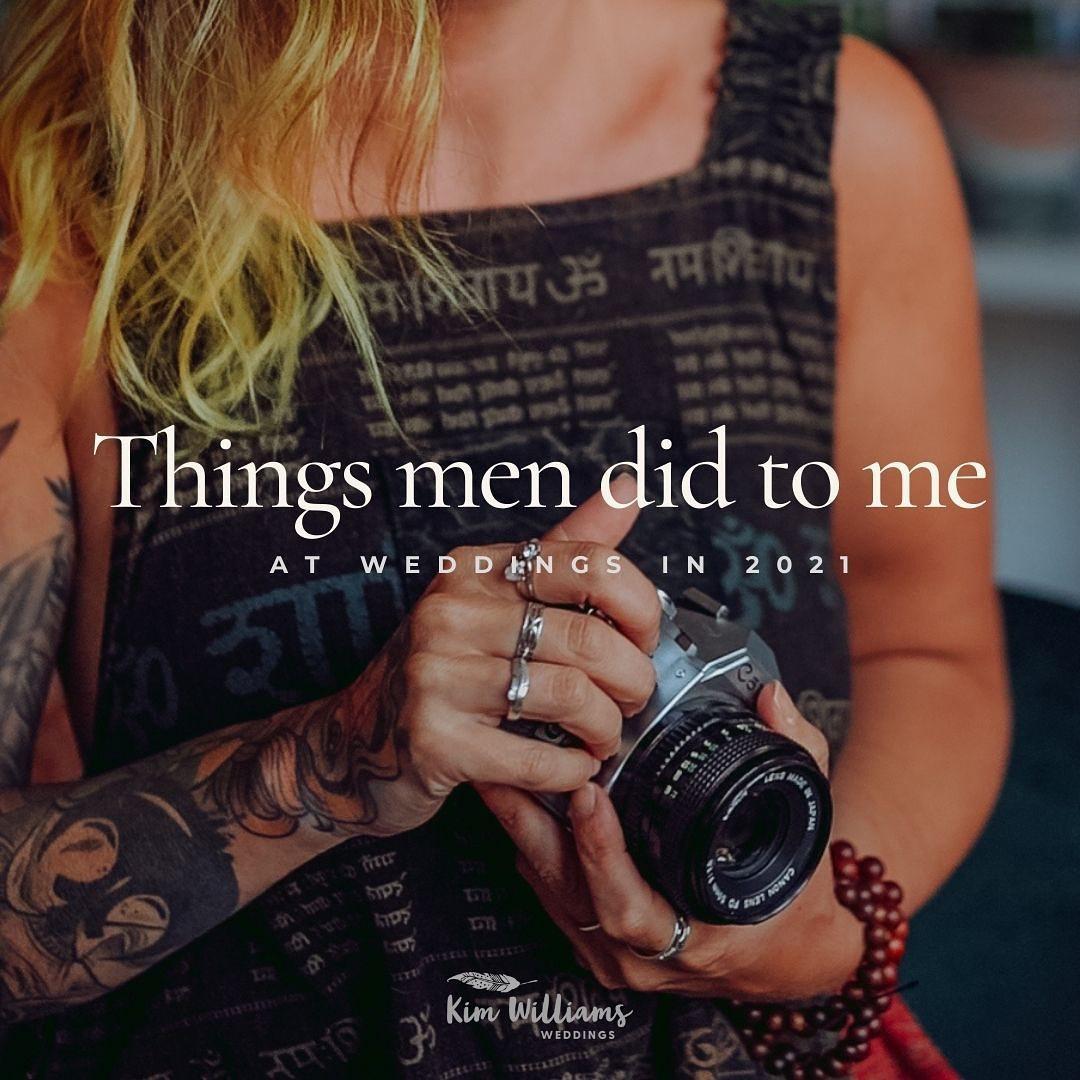
Her powerful caption read: “I know my clients will be mortified to know any of these happened at their weddings, which is why I’ve never spoken about this on Instagram before. I take great care in making sure you would never know it’s happened. But I feel it‘s a conversation that needs to be started.
“Working a job that requires you to be around large groups of cis-het men and alcohol means that this kinda stuff happens at about 80% of the weddings I shoot. I am friendly, smiley, approachable, chatty, and I get stuck into a dance floor. This is not an invitation for any of the above.
“Last year I had Tom or Victor with me for around 25 weddings (my video shooters). The men who were patronising to me, touched me, mansplained etc. never did the same to them. Tom in particular witnessed a lot of the behaviour I have to experience and had his mind blown somewhat as to how aggressive it can get.
“He asked me after one wedding in particular; I was grabbed around the neck on the dance floor after two guys had been increasingly harassing me all day, I ran outside, breathed through a panic attack, returning to shoot the rest of the night five mins later with a smile on my face and no one any the wiser…’what can I do?’
“I went away and spoke to my girlfriends, my non-binary pals, and decided it’s not our problem to fix.
“Men: go away and talk to each other. Share this post with them. Call it out when you see it. Ask the women and non-binary people in your life what their experiences of this are. Listen. Engage actively. It’s not enough for you to be ‘one of the nice guys.’ If you aren’t actively helping to solve the problem then you are a part of it.
“The same goes for white people tackling racism. The same goes for cis people tackling transphobia.
“I am very anxious to post this, and want to reiterate that I freakin’ ADORE my job. I love every wedding I work and the one I talk about in the previous paragraph was one of the most fun weddings of the year, the most gorgeous clients, a dream of a day for us to shoot! I just wanna do my job in peace.”
At the time of publication, her carousel of images had over 6,200 likes and almost 700 comments - many of them fellow wedding photographers sharing their own stories.
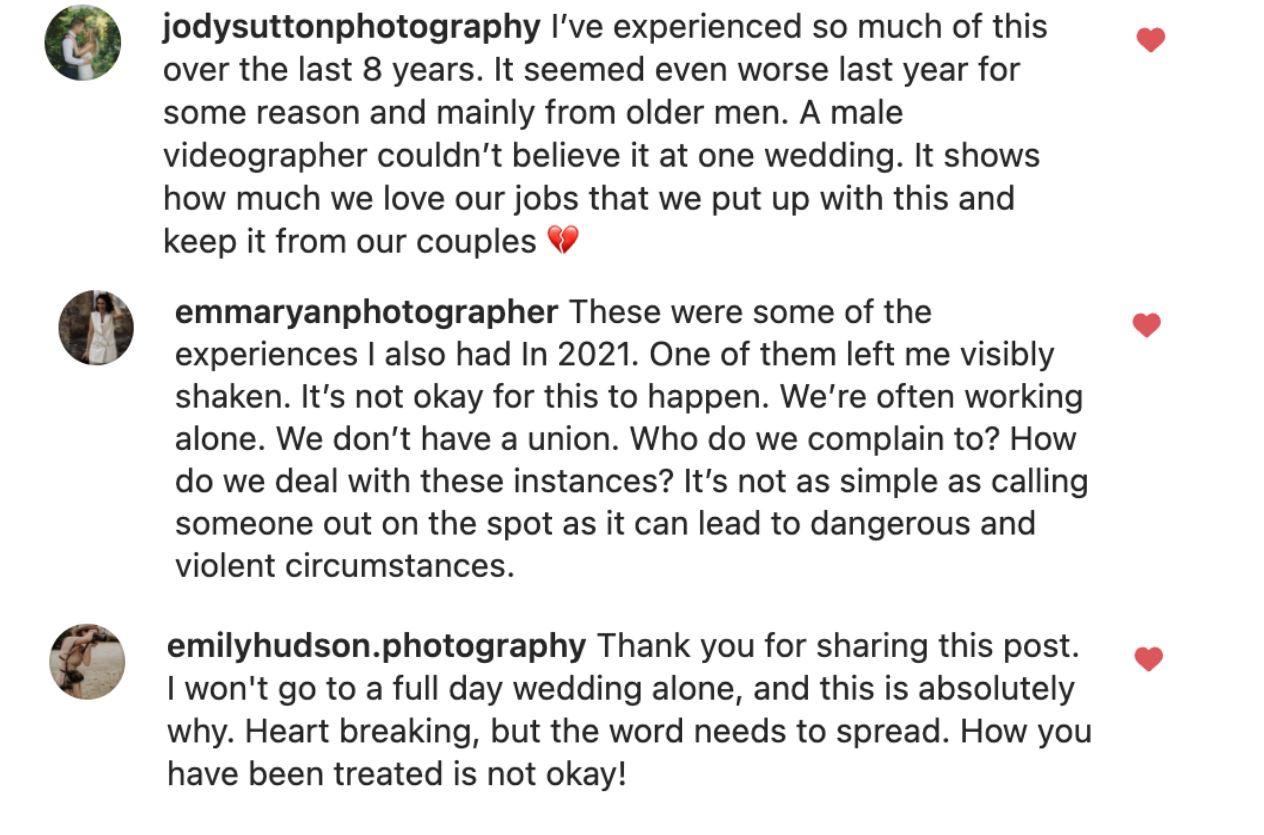
When asked about what led her to post about her experiences, Kim explained: “Last year I kept an i-note with all the times I was assaulted, harassed, mansplained to etc. At the end of 2020 I was so sick of being touched by men, and it was highlighted even more so by the fact we were shooting tiny weddings, 15 or 30 people, wearing masks and social distancing - yet they were still putting their hand on my arm every time they spoke to me, or the small of my back when they complimented me, or my waist when they wanted to move by me.
“It never felt like enough to report back to my clients. Could I really say to them ‘I’m so sorry to do this but your Dad keeps touching me and it’s making me feel really uncomfortable’? It’s a wedding day and therefore we as suppliers are making an effort to make this the best day of the couple’s lives. I’ve shot weddings during times in my life when I’ve been clinically depressed, when I’ve been up all night in pain, when I’ve had no sleep, when I’ve been through a traumatic event, and I’ve always had a smile on my face. So having Uncle Mike ridicule my kit or the best man drunkenly shout out if he can have my number during the groom's speech or that photographer ask if he can take a selfie with me to send to his wife because she ‘has a thing for brunettes’…is a breeze. Right?
“That note sat in my phone for a year and then in my drafts as an Instagram post for a month. I was scared because I didn’t want to upset my clients. I knew they would be devastated that this happened at their wedding. But I’ve been doing a lot of work in therapy and beyond about valuing myself, listening to my needs and I knew this was an issue that was bigger than me and my clients. I did a poll on my stories asking if my followers wanted to see the note, and more voted than I’d ever had before, so I hit post, and at the time of writing it’s had 65,000 impressions on Instagram alone.”
It’s important to note that it’s not enough to just raise awareness of this behaviour towards photographers - as Kim highlighted in her Instagram post, action needs to be taken.
The photographer and videographer posted a follow up carousel detailing how to keep your vendors safe at weddings - whether it’s your big day, you’re a guest or a fellow wedding pro - and included the hashtag #handsoffwedding. “The fact is that literally thousands of us experience these micro and macro aggressions every single day, and that just because it’s the ‘happiest day of someone else’s life’ does not stop the abuse… Thank you for sharing and starting conversations. I’m keen to ride the wave while it’s in motion, so here’s a starter list of things I think we can put into action…I’d love to know your thoughts. I’ve popped a link in my bio to a blog post supporting this and also to a template for a clause you can add to your contract surrounding harassment. Please keep sharing your stories using the hashtag #handsoffwedding so that we can spread the word even further.
“You can also find a link to an incredible Inclusivity Guide curated by @the.career.queer that is an absolute MUST for any and everyone in the wedding industry to read and implement. Ky offers this a PDF to download for FREE and you want their wisdom, I promise you."
How to Keep Your Wedding Vendors Safe
Kim has put together a guide to keeping wedding vendors safe as they work - and this applies to guests who are in attendance too. As well as this, she shared advice from The Survivors Trust on how to call out unwelcome and inappropriate behaviour:
- Distract: Pretend to be a friend, ask for the time, cause a distraction - be creative
- Delegate: Find someone in a position of authority and ask them to intervene
- Document: Watch and witness, write down or film the harassment
- Direct: Speak up and call the harasser out, then turn your attention to the person being harassed. If they respond, ignore them; don’t escalate. Only use direct as a last resort to prevent violence. Your safety and that of the person being harassed come first.
- Delay: Comfort the harassed person after the incident and acknowledge that the behaviour was wrong. Be a friend.
We’ve shared Kim’s guide to preventing and calling out this behaviour:
Prevent It
- Designate someone on your wedding day to be a ‘safe space’ that suppliers and guests can go to if in need.
- Let your guests know ahead of the day that you have a ‘zero tolerance for harassment’ policy at your wedding.
- Make it clear on your wedding website and/or order of service that inappropriate behaviour will not be tolerated and introduce your designated person (e.g. best man, Nick) letting it be known that anyone who feels unsafe at any point can go to them with their concerns.
- For suppliers: include a clause in your contract that states you will not tolerate harassment of any kind and will leave the wedding if you feel unsafe. Kim offers a template here.
- If you are a male supplier working with women/trans/femme/non-binary people on the day, introduce yourself to them as someone who will look out for them and have their back.
- For cis-men: Introduce yourself as an ally and safe space for the women/trans/femme/non-binary people you are working alongside
- If you know someone who is likely to behave inappropriately, engage in conversation with them and let them know they will be removed from the wedding if necessary.
- Read and share the Guide to Allyship.
Call It Out
- For the couple: Let your suppliers know that you, or your designated person, want to be made aware if anyone behaves inappropriately at your wedding.
- For the suppliers: Assess your own safety. If it feels safe to call it out there and then, do. If not, remove yourself and let your couple know the next day.
Feed It Back
- For the couple: If you have been made aware that someone behaved inappropriately on your day, attempt to engage in conversation with them that is meaningful (when you have space to). Let them know it is not okay in any situation and you will not support them if they continue.
- For the supplier: If your couple were not aware of it on the day, email them shortly after to let them know of your experience.
- For cis-men: If you have a friend or family member that you know consistently behaves inappropriately, you have engaged in discussions with them and they still aren’t changing their behaviour, let them know you will not continue your friendship with them until they stop.
- Think about the times you have witnessed your friend/colleague/family member intimidate, patronise, verbally or physically assault a women/trans/femme/non-binary person and discuss with other cis-men in your life about how you can collectively make sure these marginalised groups feel safer around you.
The challenge for many is knowing how to call it out, and Caroline shares a view on how that can be addressed: “I think that, even though it’s really difficult, we need to be prepared to stand our ground when we see this behaviour. We all have contracts in place that say we are able to leave situations involving danger and harassment, and it’s time to enforce these terms when these things happen. That’s the hard bit though, because sometimes that won’t diffuse the situation.
“What would be fantastic would be a culture of being able to say ‘I won’t take these photos unless this behaviour stops’ without causing more trouble for ourselves, and I think that involves talking to our couples ahead of the wedding day and just including this in our normal conversations with them.
“Some venues have security, and I think that makes everyone feel safer but no one wants to see security getting involved in what’s supposed to be a nice day, but if couples knew ahead of time that anyone who causes this kind of trouble won’t be welcome at their venue, then maybe those guests won’t be invited.”
Kim also has similar views when it comes to how to challenge this behaviour in a wedding environment: “It has made me question and interrogate why we slide abusive behaviour under the rug purely because of our very specific industry.
“This happens to us every day outside of work, and we all know it and we all talk about it. I think this is the first time we are ‘breaking the fourth wall’ of weddings, where we participate in keeping any negativity away from our clients, pouring everything we have into making it the best day of their lives by saying ‘actually, it’s often really hard for us’. I speak from the POV of being a photographer and videographer and a white, thin, cis-woman who holds a lot of privilege in that sense. The messages I’ve had from suppliers who are people of colour, fat, trans, live with a disability, about what they have experienced are sickening.
“We all adore our work, there is no way you would work in this Industry if you didn’t. We pour our hearts and souls into our work, give up our weekends and summers, miss out on holidays and festivals and life events because we love our jobs. We love it so much we put up with constant reminders that we are not seen as equals in the eyes of many men. We put the feelings of our couples and their guests ahead of our own rights to be treated with respect. And that is what needs to change.”
We have worked with Kim and Caroline to create a printable sign you can display at your venue - place it at the bar, in the toilets, wherever you think it will serve its purpose best and ensure that you fill in the details of how anyone who feels unsafe at your wedding can seek support.
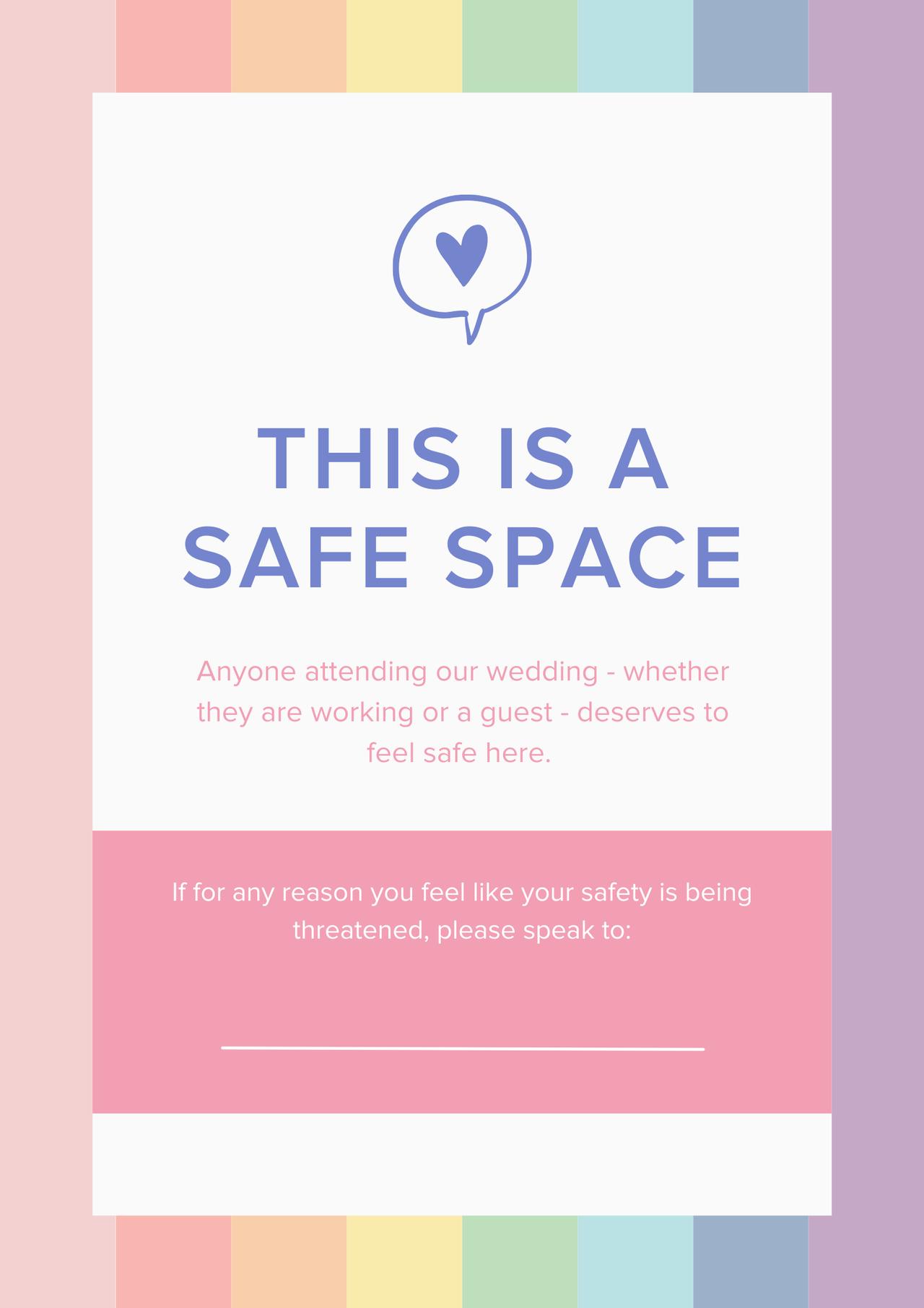
“I am really excited about the changes we can implement into the industry so that the protection of marginalised people is the norm,” says Kim. “I hope we call it out so much that it stops completely. I know that is a possibility if suppliers, venues, couples and guests work together on this. How rad is that?!”
It’s important to note that for many, weddings are a safe space and a source of joy, celebration and togetherness. But it needs to be all weddings, not many. Even if this behaviour occurred at just one wedding, it would be too many. We owe it to the people we choose to work and celebrate with to keep them safe.
*Based upon an informal poll of 200 wedding photographers in the 'Shoots Like A Girl' private Facebook group, conducted by Caroline Goosey.

